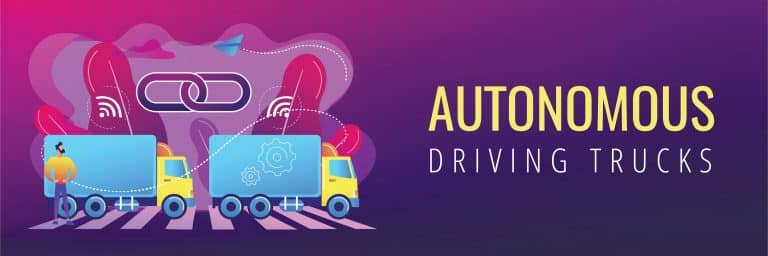Labor shortage in trucking industry may lead to autonomous trucks between transportation hubs.
Article written by Lori Lal
The US transportation and logistics industry is rapidly heading towards a problem. As first documented in 2005, the nation’s trucking sector has been experiencing a continuing labor shortage, with the 2018 deficit reaching approximately 60,800 truckers. According to the American Trucking Association, the disparity between the number of truck drivers needed on the road and the number available could reach as high as 160,000 by the year 2028. With less individuals opting to enter the truck driving force, it is not difficult to imagine the potentially related nationwide disruptions in supply chains for food, essentials, and other products that we all rely upon our truck driver heroes to provide.
One of the ways that technology is seeking to fill this labor shortage is by considering the use of autonomous trucks between transportation hubs. Ever since Elon Musk and Tesla began pioneering work on full self-driving capabilities with promising results, companies including Google and others have been quick to embrace this technology and have already produced some amazing results. Tesla touts that its autopilot and full self-driving capability system is an advanced driver assistance system that enhances safety and convenience behind the wheel. It is currently intended for use with a fully attentive driver, who has their hands on the wheel and is prepared to take over at any moment. Whether technology ultimately fills the shortage of truck drivers gap remains to be seen.
Autonomous Trucking
The potential of autonomous trucking extends well beyond solving a labor shortage and might indeed be a game-changer. For example, self-driving trucks do not become tired, do not need rest, meals, or restroom breaks. And such a model might even help reduce traffic congestion. To be sure, the specter of autonomous trucking may well completely change the future of overland transportation and logistics.
In 2016, the very first autonomous truck in the nation drove itself from Fort Collins, Colorado to Colorado Springs, Colorado. Under the constant supervision of a human professional truck driver’s assistance, this autonomous truck made the approximately 100 mile plus journey safely and without any difficulties. Four years later, while trucks currently being tested and implemented might be “self-driving” in name, they are not truly autonomous – and will still need to be driver-assisted or driver-supervised.
Drug Testing?
Nevertheless, should autonomous trucks and vehicles in the near future fill the void left by human drivers, this necessarily begs the question of whether and how traditional drug testing methods would apply. How will the drug testing industry and the Department of Transportation (DOT) react to and evolve regarding the use of autonomous trucks and vehicles for transportation that would otherwise be subject to DOT regulations? Fortunately, the DOT is committed to facilitating a new era of transportation innovation and safety and ensuring that our country remains a leader in automation. The DOT is acting as a convener and facilitator, partnering with a broad coalition of industry, academic, state and local, safety advocacy, and transportation stakeholders to support the safe development, testing, and integration of automated vehicle technologies.
For the most current guidance on this topic, the Department of Transportation has published a document entitled “Preparing for the Future of Transportation: Automated Vehicles 3.0”. The DOT and the White House Office of Science and Technology Policy are also seeking public comment on “Ensuring American Leadership in Automated Vehicle Technologies: Automated Vehicles 4.0” which builds upon AV 3.0. For now, the most current guidance is in AV 3.0 and can be found at https://www.transportation.gov/av/3.
DOT Drug Testing is a Safety Program
The primary goals of the DOT are to prioritize safety, remain tech neutral, modernize regulations, encourage a consistent regulatory and operational environment, prepare proactively for automation, and to protect and enhance the freedoms enjoyed by Americans. To this end, the DOT has affirmed its authority to establish motor vehicle safety standards that allow for innovative automated vehicle designs – such as vehicles without steering wheels, pedals, or mirrors – but notes that such an approach may require a more fundamental revamping of the National Highway Traffic Safety Administration’s (NHTSA) approach to safety standards for application to automated vehicles.
Compliance with FMCSA Regulations
With this rubric in mind, the Federal Motor Carrier Safety Administration (FMCSA) will ultimately consider whether the motor carrier has complied with the operational requirements of the current Federal Motor Carrier Safety Regulations (FMCSRs). These include, for example, compliance with rules on driving commercial motor vehicles, including the laws, ordinances, and regulations of the jurisdiction in which the vehicle is operated. Notably, however, in the case of vehicles that do not require a human operator, none of the human-specific FMCSRs apply, such as drug testing, hours-of-service, commercial driver’s licenses (CDLs), and physical qualification requirements. FMCSA is in the process of broadly considering whether and how to amend its existing regulations to accommodate the introduction of automation in commercial motor vehicles. While some FMCSA regulatory requirements for commercial drivers appear to have no application to automation – such as drug and alcohol testing requirements – many regulations, such as those involving inspection, repair, and maintenance requirements, will readily continue to be applied in this context.
As it does not seem that fully automated trucks will be in utilized for the time being – at least not without a human operator or human supervisor present – all of the current drug and alcohol testing laws and regulations continue to apply. And of course, the human operator or human supervisor will continue to be subject to drug and alcohol testing regulations. For all of your drug and alcohol testing needs, National Drug Screening continues to be the nationwide leader with state of the art testing, software, MRO, and DOT and non-DOT services. Contact National Drug Screening at (866) 843-4545 or https://www.nationaldrugscreening.com today.







